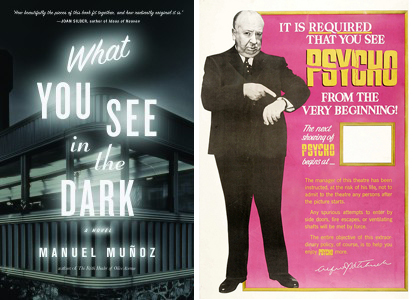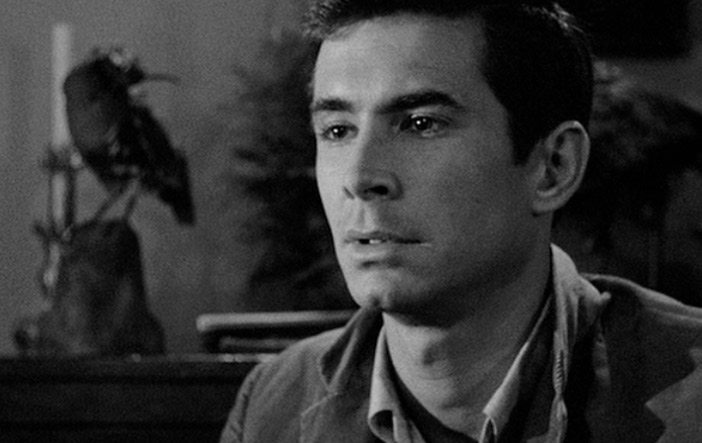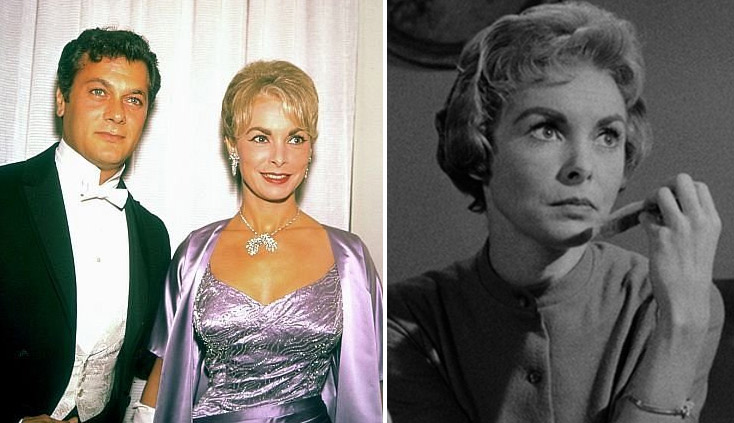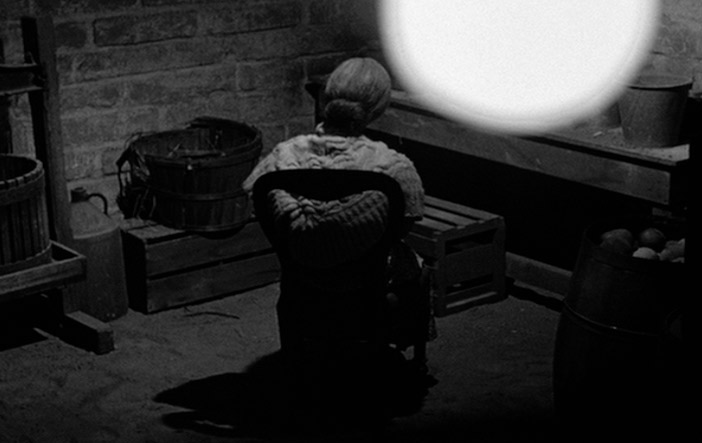Interview
The Film Experience doesn't often push books upon you, but it's time for an exception. Manuel Muñoz's debut novel "What You See in the Dark" hits bookstores, virtual and otherwise, this week. While it is a work of fiction, it borrows from reality for its backdrop. The pre-production and eventual release of Alfred Hitchcock's immortal Psycho (1960) figure into the narrative in crucial and evocative ways and both The Actress and The Director in question are characters.
 Consider this amazing "double feature"
Consider this amazing "double feature"
Full Disclosure (as I always believe in such things): I met Manuel Muñoz at a poetry event about four years ago and he introduced himself as a reader of The Film Experience. Though predisposed to rooting for him as a result (I'm only human!) we hadn't really kept in good touch. In the intervening years, I bought a copy of his second short story collection. Two months ago his first novel arrived in galley form and I ate it right up. I think it's quite an amazing read.
Nathaniel: Before your beautiful novel, which we'll get to in a moment, you had two short story collections published. The first piece of yours I ever read was "Skyshot" which had an amazing Robert Altman thread. That really won me over. How did that story come about and has the cinema always inspired you creatively as a writer?
Manuel Muñoz: I was lucky enough to see Nashville on the big screen at the Brattle in Cambridge when I was in college. I was stunned by it, and it remains my favorite film (with The Piano a close second.) Altman's command of multiple character arcs enthralled me--it was the closest I'd seen a film parallel the possibilities of words on the page. He could shift magnificently and I loved that he could suggest interiority with camera movement: I was stunned when I realized the camera had crept up on Lily Tomlin as she listened to "I'm Easy." (He did the same to Ronee when she sings "Dues.")
At the time, I was coming to terms with identity and subject matter, so it confused me to be so attracted to a film like Nashville, which is far outside my experience.
 Manuel Muñoz by © Stuart Bernstein
Manuel Muñoz by © Stuart Bernstein
But I eventually thought of how often we use films to narrate our own lives. I've never sat at the back of a bar while in love with a performer on stage, but I've worn that look that Lily has on her face. Know what I mean?
Nathaniel: I think so. But to the point on identity. I've always believed that specificity -- be it in sharply drawn characterizations or carefully observed milieus -- has a way of inverting itself so it's suddenly universal. I see that in your writing too as you're often dealing with the Chicano experience, which I have little connection to and yet it's totally alive for me.
I'm guessing this has a lot to do with an assured storytelling voice, one that's relaxed about the audience feeling whatever it is they're going to feel without forcing it upon them.
Read the full interview for more on Great Actressing, casting dreams, Psycho and unlikely inspirations.
Manuel: I like how you phrase that. It's true: the audience is going to feel whatever it chooses to feel, and there's little use in being heavy-handed about pushing a particular direction. When I finally figured that out in my own writing, it meant accepting that I had grown into a particular style, a particular way of telling. I'm very driven and excited by writing that honors interiority, that really tries its best to get into the unreachable mind of a character. I love details, turns of phrases --everything that makes me slow down as a reader. And I'm drawn to high emotional pitches, too--melodrama, some might call it. I'm a bit of a swooner that way.
Nathaniel: Melodrama is totally undervalued. So bring on the high emotional pitches.
I also liked that it brought me close to the sense of the "little voice" we all carry around inside our heads: I always like to ask friends if, when they talk to themselves, whether they use "I" or "you." Either answer makes you sound a little nuts. In Psycho, Marion Crane never really talks to herself, but part of the narrative clearly takes place as if she is, indeed, thinking something over.
Nathaniel: So true. For the record I use "you" and am a little nuts -- I don't just sound it. So there's that famous Psycho phrase sneaking it's way in...

We all go a little mad sometimes.
Manuel: Absolutely. I use "you" too, by the way. Strange.
Every time I watched Psycho while writing this novel, I was transfixed by Janet Leigh in that scene. The narrative weight is all behind Perkins and the script isn't calling for her to do much but listen. Yet, I can't take my eyes away from her. That face! Even the way she eats her sandwich has a calculation to it, a nervous nibbling. It's a seamless, meaningful gesture, too.
See what I mean by details? I just saw It's Complicated with some friends and, while I didn't care for the film, I could've watched Meryl Streep take off and put on her reading glasses all night.
Nathaniel: Meryl Streep, Queen of "business".
Since you brought up Leigh, and as you probably surmised given that I am me, my favorite character in the book is The Actress (followed closely by "Arlene"). I loved the interiority, to mimic your words, that you granted her. It really does play in well with watching Leigh's performative self-consciousness in Psycho. Marion Crane is continually judging and monitoring her own actions / emotions. And here, in your novel, we have The Actress doing the same with her self in a way.
But I wonder if this would have worked with an actress who the audience had a clearer (presumed) knowledge of, in terms of her offscreen personality? Did you spend any time considering / worrying about how much the audience would or wouldn't know about Psycho, Leigh and Hitchcock?
Manuel: Do you recall Cate Blanchett's Oscar acceptance speech, when she described Katharine Hepburn as "terrifingly well-known"? There was a bit of that apprehension when I first considered writing an Actress chapter. Leigh never had the aura of a Monroe or Taylor, but she has been blessed with being forever identified with a singular and magnficent performance. Everything about her is filtered through her presence there. In depicting her approach (and remember, this is fiction), I really tipped my hat toward fans of her (rather than the film). I think those who really appreciate her performance would probably agree with me that the character is rather flat on the page, and it took an actress with her facial and vocal resources to really make her the center of that story.
I worry less about readers who know the film inside and out than I do about people who don't: I took pains to make it clear that the film was not actually shot in Bakersfield but on set in LA, and that the presence of the Director and Actress in Bakersfield is about scouting for locales. I hope the homage to Leigh is what garners the most attention.
 Tony Curtis and Janet Leigh at the Oscars for her "Psycho" nomination
Tony Curtis and Janet Leigh at the Oscars for her "Psycho" nomination
Nathaniel: It will surely make people reconsider the performance yet again. The chapter on the shower scene is pretty spectacular, although I don't want The Film Experience readers to get the impression that you're *just* writing about Psycho. Psycho is more like a transluscent overlay, metaphoric guide, visible underwire? I'm not sure what you'd want to call it.
It's very much about the people of Bakersfield and in a broader sense the dark edges of our limited field of vision. What's waiting for us out in the dark? I'm making it sound like a horror novel. Which it isn't. Sorry!
Manuel: Well, do you consider Psycho only a horror film?
Anytime we try to fence in a piece of art, it's bound to break those confines if it can offer more than just the sum of its parts. (I hope I did!) Look at Sissy Spacek in Carrie. The much-maligned Stephen King has some of my favorite lines ever. In Carrie, a brief, devastating description of desk graffiti, with the callous line, "Carrie White eats shit." Or this saucy number from, of all books, "It" "He had a nice, polite college boy's cock. Long enough to jazz with, but not thick enough to be really arrogant." I mean, my God--"jazz"? Genius!
As you can see, I received my booklet on How to Respond Like a Serious Writer...
I am all for finding inspiration in the unlikeliest of places, of story arcs, of details. That's why I try to remain open to all sorts of movies and books --I never know what it might prompt me to think about. Every artistic gesture, successful or not, has a way to inspire us.
Nathaniel: I absolutely feel you here. Sometimes, for example, when I'm talking to people offline they seem confused when I say I'm glad I saw or read something that I didn't like . But for me what art prompts in us, can be just as interesting (or moreso) than the work itself.
So right away I was predisposed to enjoy your novel because I enjoy the hand-me-down and pass-it-on nature of art and artistic inspiration so much. But I have to admit I was nervous reading your novel (for the first couple of chapters) because I was like, can he pull this off?
Manuel: I hope I did! The novel went through five drafts. At its longest, it was 300 pages, and Hitchcock had a lot more space. But I became less and less interested in him, and the reality of the scope of my project made itself more clear as I went on. It was a chance, ultimately, to give prominent space to women as the central engines of narrative, to do something that most films and books still don't do as often as they could. Yes, we've talked about Leigh a lot here, but there is definitely much at stake with the young singer Teresa and the lonely waitress Arlene. In the latter, much of her character came from asking myself who might have occupied that chair when Lila taps the figure in the cellar, what she could have said, if she had been something other a macabre joke.
Nathaniel: Well, you have a gift for this haunting character investigation. Thank yourself in that next second person singular conversation.

I was also wowed by Teresa co-worker. She's barely in it but it's like seeing one of those perfectly constructed character bits. 'I'm Beatrice Straight and I just won the Oscar in five minutes. BAM!'
Now I'm rambling and gushing but these characters really breathe. Sometimes when people leap from familiar precipices -- like say, half a century old film classics -- they don't catch their own air. But you're flying.
Manuel: Thanks, Nathaniel. It means a lot to me that a film lover would like the book.
Nathaniel: You're very welcome. I hope you have a best-seller on your hands. Then you'll have a whole mess of new problems to deal with like "Who should I sell the movie rights, too?" because damn, this would be a tall order for a film adaptation.
Manuel: One can only hope. I'm no spring chicken, so maybe it'll help me land a husband. Frances McDormand can serve a mean cup of coffee, I bet...
Nathaniel: You're already casting? That way lies the madhouse.
Still, may all of your first choices say yes: McDormand, husbands, and on down the call sheet.

"What You See in the Dark" is currently available for purchase. I have three copies of the book for giveaway but I really suggest buying a copy. If you win, you can always gift your extra copy. Support great writers and creative cinephiles!
Related Post: Psycho's Best Shot